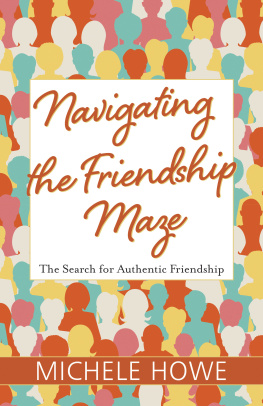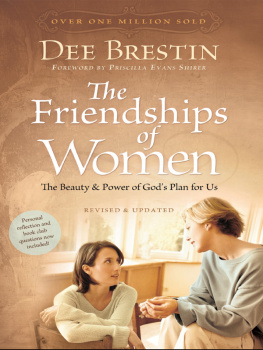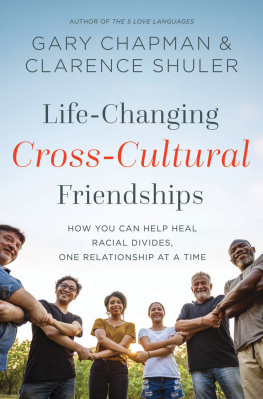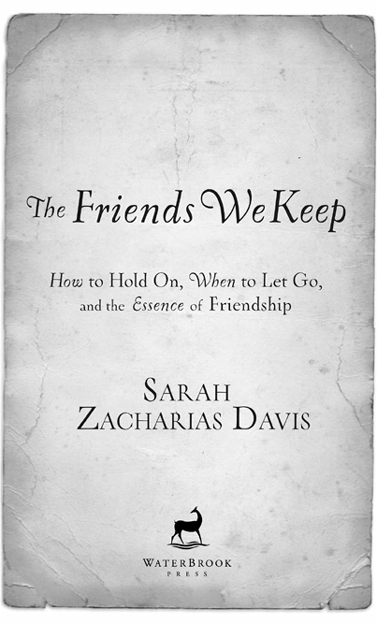Praise for
The Friends We Keep
Friendships take years to cultivate yet can be lost in a matter of minutes. Sarah Zacharias Davis deftly explores the complex terrain of that human bond, explaining why so many of us long to be known and how important it is cultivate at least a few faithful people who will stand beside us the rest of our lives.
J ULIA D UIN , religion editor for the Washington Times and author of Quitting Church: Why the Faithful Are Fleeing and What to Do About It
Sarahs words could not come at a better time. Too many of us have allowed our female friendships to slip on the priority scale, and this book is the perfect reminder of the essential, beautifully ordained connection between women. Reading and relishing her words, I recalled with rich nostalgia the formative friendships of my childhood and emerged from the pages with a fresh perspective and heightened appreciation for the special women in my life today. This book reads like the voice of a friend, intimate and true.
K RISTIN A RMSTRONG , contributing editor for Runners World magazine and author of four books, including Happily Ever After: Walking with Peace and Courage Through a Year of Divorce and Work in Progress: An Unfinished Womans Guide to Grace
For my friends:
You enrich my life immeasurably.

I awoke this morning with a devout thanksgiving for my friends, the old and the new.
R ALPH W ALDO E MERSON

Contents
14
Whom Do You Call Friend?
My eyes flooded with tears that began rolling down my face. Horrified at my public display of grief, I had to keep myself from all-out sobbing over Isabels death before the person sitting next to me on the plane thought me mentally unstable and requested to be moved to another seat.
This was my third time reading the book The Saving Graces, and I cried all three times when each of the friends read Isabels letters after her death. I stumbled upon The Saving Graces, a novel by Patricia Gaffney one evening when perusing Barnes and Noble for something good. The words New York Times Bestseller caught my eye, and I decided to give Gaffney a try, though I was unfamiliar with anything she had written.
The Saving Graces is the story of four friends and how each is there for the others through the ups and downs of life: childlessness, broken relationships, love, illness, and death. I read the book three times because I wanted to join the friendship circle of Lee, Rudy, Isabel, and Emma again and because it deeply impacted the way I viewed friendship, both the kind of friendships I wanted and the kind of friend I wanted to be. For me The Saving Graces raised the bar, as well as the stakes. I loved the way the others supported Rudy when she moved out of her home and through the abuse she encountered. The unmitigated appreciation for each individual friend was evidenced as Isabel wrote parting letters to her three friends. I was inspired by the manner with which the friends got snippy with each other and yet quickly forgave and forgot.
Finally, I was moved by how the loss of one left an enormous hole that could not, nor would, ever be filled in the others. I found this especially, exquisitely stunning, thus moving me to tears each time I shared these womens lives. They were there to defend, laugh, comfort, give physical care, and even give spaceall that real life requires. These were friendships of depth and honesty, strength and longevity. These friends loved each other in all their messiness. No one had to bring perfection to the friendship, only loyalty.
My reluctance to leave the world of the four women and close the book for the third time invited explorational thoughts of friendship. What was it about their friendships that left me reluctant to leave their company and return to my own life? Is that what my friendships were supposed to look like? Did I need to find a Rudy an Isabel, a Lee, or an Emma to fill the longing that this novel surreptitiously uncovered in my soul? Did my own small collection of friendships seem not enough compared to the bond these four shared? And why not? Was it the way they supported one another or the way they always made time for one another? Or was it the way one could behave in a manner that was very unlovable and yet still remain loved?
At the risk of making a grand, sweeping gender statement, Ill point out that some men seem to have categories of friends. They have work friends, friends for playing weekly pickup basketball games, golfing friends, and friends forced on them by a significant other. Seldom do they see these friends outside their category of identity, yet they would call them friends. Many of the friendships women hold, however, seem to make their way beyond the circumstances that brought them together and meander into their lives through both the valleys and the peaks, eventually ending up in the womens souls, where they can both restore and destruct. And yet, isnt a real friendship one that would bring both the yin and the yang, so to speak? Is the multidimensional aspect of the relationship the very characteristic that makes it a true friendship? Would I have been so captivated and, yes, envious of the saving graces if their friendships contained no shadows?
History is rife with story upon story of love, commitment, bravery, loyalty, betrayal, and disappointmentall within friendships. And in our own personal histories, many of the same stories can be told. Friendship is a relationship we desire and cultivate early in our development, whether we had an imaginary friend as a constant companion or we began the first day of school as shy, pigtailed little girls inviting another to be our friend.
For a woman, the connection to friendship is innate and essential. It feels so vital to living that the desire for it seems part of our fabric of being. Cicero said friendship springs from nature rather than from needfrom an inclination of the mind with a certain consciousness of love. This is certainly true across generations and cultures.
Early Chinese culture held womens friendships as almost sacred. In her beautiful work of historical fiction Snow Flower and the Secret Fan, Lisa See educates her readers about sacred friendship practices. The Chinese women of this patriarchal culture committed themselves to very deep friendships, knowing there was substance and soul that could exist in no other relationships.
There were two types of soul friendships: sworn sisters and laotong, which means old same. Sworn sisterhoods were groups of unmarried women who became friends. These sisterhoods dissolved at the time of marriage. A laotong relationship was between two girls from different villages. Many superstitions were observed before two girls would be found to be a match. They were usually the same age and both born in auspicious years, according to the tradition.















